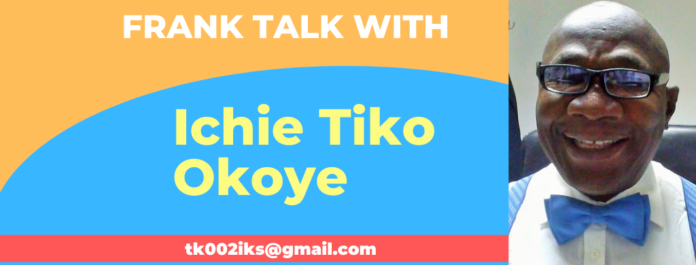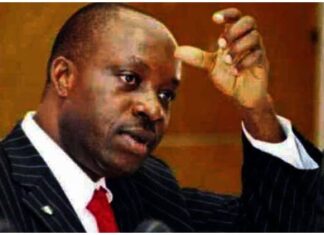The author continues with his analysis on how the 2023 presidency will pan out.
By Tiko Okoye
In Part 1 of this series, I established the concrete foundation for preening myself on the 100-percent manifestations of my predictions of outcomes of presidential elections in Nigeria since 1999. I’m very much, in intent and purpose, in the same place as the metaphorical red-neck lizard that rather immodestly nods its head in self-acknowledgement of its dexterity in landing on all fours on the ground from a dizzying height when nobody else deigns to applaud the feat.
The Oxford Advanced Learner’s Dictionary defines electioneering as the activity of making speeches and visiting people to try to persuade them to vote for a particular politician or political party in an election.” Vote is defined as “a formal choice that is made in an election in order to choose or decide something.” Public opinion is defined as “the opinions that people in society have about an issue.”
We are in the digital age hence any candidate and/or party that has mastered how to leverage on what has become a very powerful, if not the most powerful, tool for influencing public opinion within the shortest possible period of time – the internet – is many steps ahead of the competition. Social media platforms have easily become the fastest and most-cost-effective way to make speeches and connect with large swathes of audiences across widely dispersed locations in an attempt to try to persuade them to vote for a particular politician or political party. Little wonder that the position of special aide on ‘new media’ has become very popular within the corridors of power.
The most important aspect of the vote is that it is formally conducted by marking a ballot paper in a polling booth before being cast into a ballot box. What this means is that a candidate may have a solid backing in the social media but it would amount to nothing if this cannot be transferred into actual ballots cast on election day.
The importance of public opinion is incontrovertible, as captured by the Latin phrase that says Vox populi est vox Dei (“the voice of the people is the voice of God”). Napoleon Bonaparte, Emperor of France, unabashedly declared that “Public opinion is the thermometer a monarch should constantly consult.” On their part, Abraham Lincoln and Franklin D. Roosevelt, 16th and 32nd US Presidents respectively said that: “A universal feeling (public opinion), whether well or ill-founded, cannot be safely disregarded” and “There is no group in America (or anywhere else for that matter) that can withstand the force of an aroused public opinion.”
But even at that, public opinion scholars Lawrence Jacobs and Robert Shapiro posit that most public opinion research is used to manipulate the public rather than to act on the latter’s wishes by not using it, for example, to hone their policies but only to identify slogans and symbols that will make predetermined policies more appealing to voters.
Iconic German philosopher Wilhelm Friedrich Hegel described opinion poll as containing both truth and falsehood, begging the question what proportion of users of such a communication tool are in any position to distinguish between the two in a relatively highly illiterate polity that appears fossilised in primordial stratum like Nigeria. Is it really possible to conduct a credible nationwide poll in a language that more than 60 percent of the population can’t comprehend and with demographies as diverse as the many colours on the coat of Joseph? Anybody deceiving you can continue deceiving you!
READ ALSO: 2023 Presidency: Anybody deceiving you can continue deceiving you! (1)
A very high proportion of ‘scientific’ public opinion polls in Nigeria are actually unscientific surveys that violate all the guard rails of proportional, rational and heterogeneous sampling. Their sole usefulness appears to lie in manipulating the real public opinion by interest groups of different shades (including candidate support groups) or issue-specific organisations, many of which are known to exploit straw-poll results as a means of making their causes seem more significant than they really are; and all of who retribution most likely awaits at the ballot box.
Needless to say that the reader must appreciate that caveat emptor or ‘let the buyer beware’ still applies in public opinion surveys i.e. a burden is placed on the reader to perform due diligence prior to swallowing the bait hook, line and sinker – an exercise a vast majority of readers are either unequipped to handle or simply can’t be bothered to perform.
Due to space constraints I’ll discuss only two of those instances when and where contrived opinion polls have been used to push false narratives with the clear intention of manipulating the voting public and fraudulently flipping the outcome of an impending election.
During the run-up to the 2007 presidential election, a very popular Nigerian national newspaper (name withheld) commenced a series that focused on predicting voting results state-by-state. The report – with the maps of Nigeria and its constituent states differentiated by colours for winning candidates/parties – was ‘proudly’ carried on the front page. It was a noble idea, except that the entire exercise amounted to attempting to build a castle in the air.
That my supposedly literate and savvy associates at the newspaper outfit where I then served as Editorial Board member and Op-Ed writer dissipated so much energy and time discussing what was obviously a non-event made me wonder how many of the newspaper’s readers knew that an ‘exit poll’ – on which the newspaper entirely based its predictions – never precedes an actual election! To their credit, upon I savaging the entire farce in my column, the editors wisely stopped further publications of the series.
A second principal way in which vendors of public opinion polls manipulate both candidates and voters is by ‘gaslighting.’ The term comes from the 1938 play ‘Gas Light’ – later released as a movie christened ‘Gaslight’ – in which a husband isolates and manipulates his ‘normal’ wife with the goal of putting her in a mental institution for insane patients. Yale University Professor Robin Stern introduced the term in the public lexicon with her 2007 best-selling book titled “The Gaslight.”
Signs of gaslighting include: (1) Others insisting you said or did things you know you didn’t say or do; (2) Others denying or scoffing at your recollection of events; (3) Others twisting and retelling events just to shift blame to you; and (4) Others always insisting they are right and refusing to consider facts or your perspective of the events.
The effects of gaslighting include: (1) An urge to apologize all the time; (2) Frequent feelings of nervousness, anxiety or worry; (3) A loss of self-confidence; (4) A persistent premonition that something isn’t right, though you can’t identify exactly what’s wrong; and (5) Making choices to please others instead of yourself; and (6) Constantly reviewing your words and actions to ensure you’ve done everything ‘right.’
It is in the context of gaslighting as a form of orchestrated and sustained psychological or emotional abuse or manipulation, in which the abuser attempts to plant the seeds of self-doubt and confusion in their victim’s mind as a way of gaining power and control over the other person, by distorting reality and forcing them to question their own judgement and intuition, that you can more aptly interpret the substitution of issues-based electioneering with an unrelenting clamour for candidate-disqualifications on the grounds of ‘forged’ educational certificates, drug use, drug trade, money laundering, Panama papers, diversion of State funds, etc.
And if you come to think of it, practically all the three presumptive front runners in next year’s presidential election have been subjected by voters, and each other, to varying degrees of gaslighting under the facade of ‘scientific’ opinion polls and free speech.
It’s also pertinent to distinguish between a ‘public opinion’ and a ‘popular clamour.’ English author William Mackinnon defined public opinion as “that sentiment on any given subject which is entertained by the best informed, most intelligent and most moral persons in the community,” and ‘popular clamour’ as “that sort of feeling arising from the passions of a multitude acting without consideration (‘headless mob’).” Isn’t it just possible that what have been dominating public discourse in recent times in the guise of opinion polls are just mob clamour polls? Remember the numerous polls predicting the Republican ‘red wave’ in the 2022 US midterm elections that never was?
And before misconceptions materialise and speculations run riot, let me hasten to state that I do not claim to be the perfect, all-knowing analyst who is never wrong. Those attributes belong only to God. What I however do know is that I invest a lot of time and energy poring over archival and contemporary records of people, places and events with a view to properly connect the dots that compromised eyes and minds can’t perceive.
- Continues next week with a detailed zone-by-zone prediction of winners and losers.











